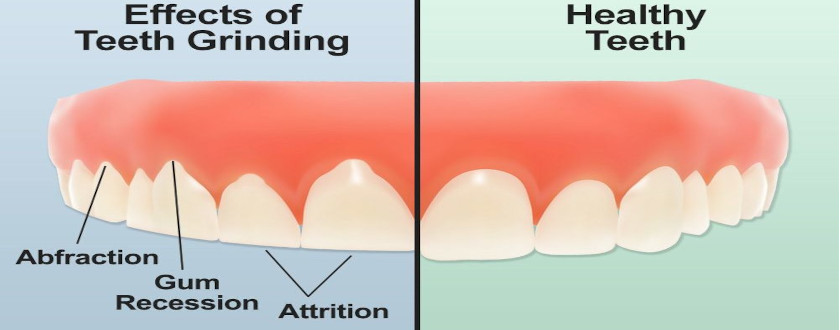
Teeth Grinding/ Clenching (Bruxism)
Bruxism is the medical terminology used for grinding the teeth and clenching the jaw. It is an involuntary action and does not cause much harm if it happens occasionally. But when it happens on a regular basis it may lead to teeth damage or other health complications. Clenching or grinding your teeth may also be present during the night, known as sleep bruxism and often goes unnoticed unless noticed by your loved ones at night.
Causes
Though the exact causes of bruxism are still not known it is attributed to the following factors
- Stress, anxiety, anger, frustration etc.
- Malocclusion of teeth i.e. misalignment between upper and lower teeth
- Having and aggressive, hyperactive personality.
- Sleep related problems such as sleep apnea etc.
- Rarely due to the effect of antidepressants or psychiatric medications
- Lifestyle such as drinking, smoking, recccrrreational drugs put you at an increased risk.
Symptoms
One of the most obvious symptoms of bruxism is the loud grinding or clenching sound that may awaken your sleep partner. Apart from this other symptoms include
- Fractured, loose, chipped or flattened teeth
- Jaw pain, headache and/or ear pain.
- Stiffness /Pain in the face or jaws, temples etc especially when you wake up
- Sores on the inside of the cheek due to biting
- Tooth indentations on tongue
- Sensitivity of teeth
- Worn out tooth enamel
- Tooth ache especially after waking up.
If you suspect you have been grinding your teeth, make sure that you talk to one of our dentists. Chronic teeth grinding can prove to be harmful as it may lead to fracture or loosening or even loss of teeth.
Treatments
There are a number of possible treatments that have proved to be effective in teeth grinding.
- Wearing splint or mouth guard over your teeth may help reduce the damage to the teeth caused due to clenching or grinding.
- Correcting the alignment of the teeth may help reduce any bruxism caused due to malocclusion.
- Stress management therapy may help you manage stress through relaxation, exercise and meditation.
- Behavioral Therapy may help you practice proper jaw and mouth positions and reduce teeth grinding.
- Though medications have not proved to be of much help certain muscle relaxants are at times prescribed by doctors for a short span of time.
Here are also a few tips that you may practice to reduce teeth grinding
- Avoid or reduce the consumption of food and drinks that contain caffeine such as coffee, chocolate and colas.
- Avoid alcohol consumption.
- Avoid biting on hard substances and that include nuts, candies etc and includes chewing gum as well.
- Throughout the day, you need to train yourself to relax your teeth and jaw.
- Reduce stress.
- Hold a warm cloth against your cheek at night to relax your jaw muscles.
The ultimate goal of the treatment is to reduce the pain, prevent damage to teeth and reduce clenching/grinding. In many cases, no therapy or treatment is required and you stop grinding your teeth. But if the problem is severe, talk to one of our dentists.